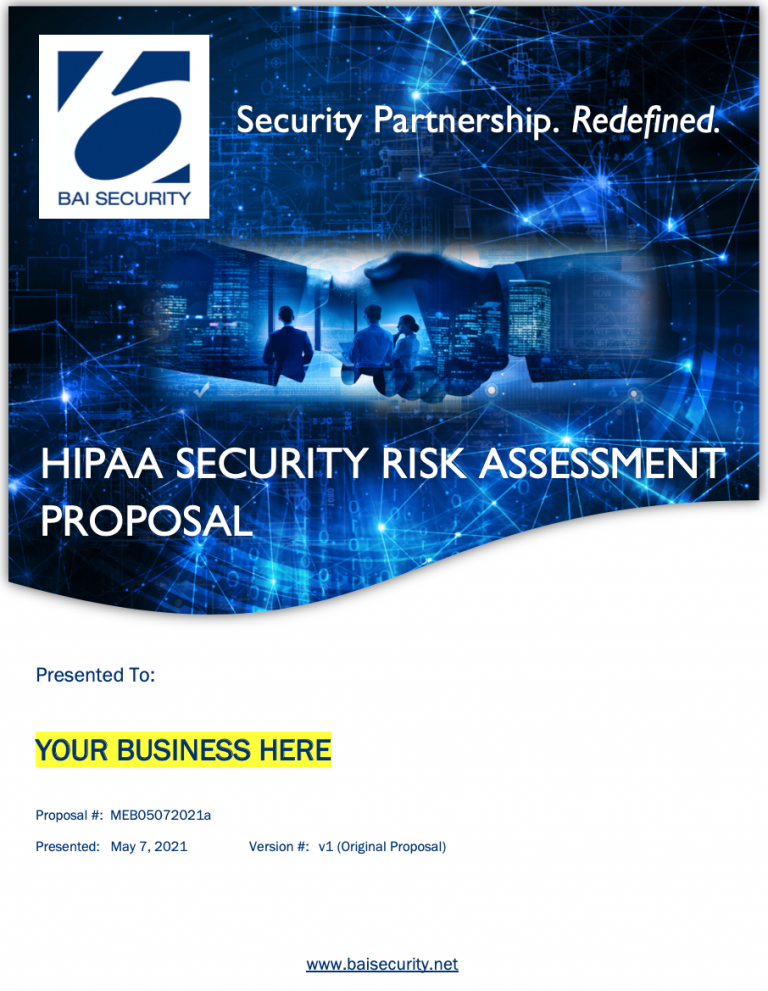HIPAA SECURITY RISK ASSESSMENT
Ensure compliance while protecting health data, critical functions, and most importantly –
patient safety.
ENSURE YOUR HEALTHCARE ORGANIZATION AND PATIENTS ARE FULLY PROTECTED
Attacks targeting healthcare entities and damaging patient data breaches are at an all-time high. With BAI’s comprehensive HIPAA Security Risk Assessment, you can secure your day-to-day functions, your patients’ data and safety, and your community’s trust — all while ensuring regulatory compliance.

PROTECTION FOR PHI & CRITICAL FUNCTIONS
You need a team that knows both healthcare and cybersecurity. With BAI Security’s comprehensive HIPAA Security Risk Assessment, we help you affirm your HIPAA compliance, as well as the safety of your patients’ Protected Health Information (PHI) and day-to-day tech-reliant medical and record-keeping functions.
With highly effective tools and proven audit processes, as well as exceptional support custom-tailored to your needs, we provide a clear path to meeting and exceeding ever-evolving regulatory requirements. To complement your HIPAA Security Risk Assessment, we recommend a HIPAA Privacy Risk Assessment.
Exhaustive Evaluation & Risk Mitigation
Our HIPAA Security Risk Assessment evaluates all levels of your organization, including:
- Network Security: We thoroughly evaluate your network to validate its security and proper monitoring.
- Data Security: We audit your controls to ensure PHI is properly secured and protected.
- Infrastructure Security: We assess your workstations, server, and network infrastructure devices to confirm they do not pose a risk to your security posture.
- Risk Management: We integrate assessment findings to measure your risk against a negative security event and empower you with immediate mitigation tools.

EASY, Secure Portal
Conducting a HIPAA audit on every aspect of a healthcare organization’s operations can be complex. This is particularly true for smaller medical practices with limited resources, as well as larger healthcare networks with numerous locations and personnel.
This is where our deep experience working with hospitals, clinics, campus healthcare, satellite offices, and more, matters to be able to comprehensively audit your environment without creating a burden for your team.
BAI's Secure Portal makes assessment, compliance, and tracking easy for your team. Just log in, upload your relevant documents, and track progress — we’ll take care of the rest!HIPAA SECURITY RISK ASSESSMENTS
The U.S. Department of Health & Human Services (HHS) articulates an objective of a HIPAA risk assessment – to identify potential risks and vulnerabilities to the confidentiality, availability, and integrity of all PHI that an organization creates, receives, maintains, or transmits.
To achieve these objectives, HHS suggest healthcare organizations should:
- Identify where PHI is stored, received, maintained or transmitted.
- Identify and document potential threats and vulnerabilities.
- Assess current security measures used to safeguard PHI.
- Assess whether the current security measures are used properly.
- Determine the likelihood of a “reasonably anticipated” threat.
- Determine the potential impact of a breach of PHI.
- Assign risk levels for vulnerability and impact combinations.
- Document the assessment and take action where necessary.
A HIPAA Risk Assessment is not a one-time exercise. Assessments should be reviewed periodically, as well as whenever new work practices are implemented or new technology is introduced.
A HIPAA Security Risk Assessment should reveal any areas of an organization’s security that need attention. Organizations then need to compile a risk management plan that addresses the weaknesses and vulnerabilities uncovered by such an assessment, as well as the implementation of new procedures and policies where necessary to close the vulnerabilities most likely to result in a breach of PHI.
PROTECTING YOUR DATA & OPERATIONS

BAI Security’s commitment to delivering not just assessments but tangible, strategic recommendations for long-term security enhancement differentiates them as a trusted partner.
VP Cybersecurity

The professional experience and technical expertise made the choice an easy one… exceptional results. We are completely satisfied.
CISO
NY
There are a lot of service providers out there, but your staff were personable, friendly, knowledgeable and made it very clear they were there to help us get better, not to find as many exceptions as possible.
IT Manager

They go out of their way to be helpful, offering guidance (not a cookie-cutter approach). We chose BAI because of their reputation. We went back because of their people and professionalism, the depth of their technical knowledge, and friendliness.
IT Director
IL
Far more extensive test than any we have had in the past… The reps are 100% on your project and always available to give you feedback.
CISO
OH
BAI Security’s reputation for delivering high-quality assessments and their commitment to staying abreast of evolving security landscapes were key in our decision-making process. The BAI team has been instrumental in providing actionable recommendations, allowing us to strengthen our overall security posture.
VP Cybersecurity

Outstanding platform for vulnerability remediation. Everyone I talked to from sales folks to technical experts were all great to work with and very knowledgeable.
VP of IT
PA
The experience was great, and I felt that BAI had my back. The techs were great to work with and helped me resolve security issues. They were working with me to correct issues rather than just pointing out what was wrong.
VP/CIO
MI
There are many players in this field. I contacted some of my industry peers and asked who they used. BAI came in at the top.
IT Supervisor
IN
I love how in the final deliverables recommendations are provided. I’ve seen other solutions (and past vendors) who simply tell you what’s wrong without any help to remediate.
IT Security Officer
VT
The dedicated engineer that learns our environment is huge! Also, the reporting is as high level or granular as you need it to be.
IT Director
PA
We have worked with BAI Security for 5+ years. They are professional, knowledgeable and personable. The technicians have a great understanding of our complex infrastructure
IT Director
ND
Price was right, service was excellent, and the final deliverables were outstanding. Great team.





